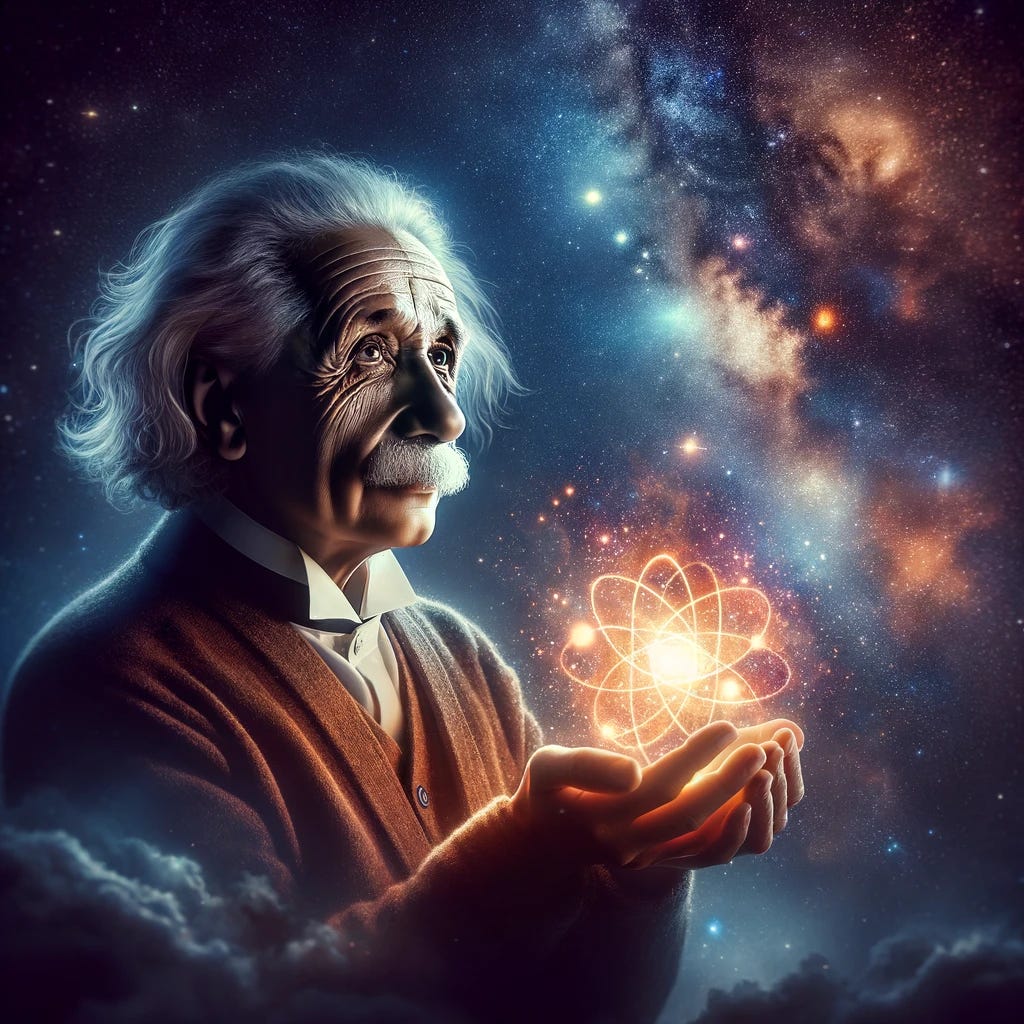''I have no special talent, I am only passionately curious'" - Albert Einstein - What This Quote Means In Depth (Feature Length Article)
''I have no special talent, I am only passionately curious'" - Albert Einstein - What This Quote Means In Depth (Feature Length Article)
Introduction
Opening with the full Einstein quote and its popular appeal.
Brief overview of who Einstein was beyond the common perception as a genius physicist: his values, beliefs, and personality traits.
Introduction to the theme of the article: exploring the depth and implications of passionate curiosity.
Chapter 1: Understanding the Quote
The context in which Einstein said, "I have no special talent, I am only passionately curious."
Detailed analysis of what Einstein meant by "no special talent" and "passionately curious."
The role of curiosity in Einstein's discoveries and thought processes.
Chapter 2: The Science and Philosophy of Curiosity
Exploration of curiosity as a psychological and philosophical concept.
The evolutionary advantages of being curious.
Different types of curiosity (e.g., epistemic curiosity, perceptual curiosity) and how they relate to Einstein's version of curiosity.
Chapter 3: Historical Figures and the Role of Curiosity
Case studies of other historical figures who exemplified passionate curiosity.
How curiosity led to significant discoveries, innovations, and changes in various fields such as science, literature, and art.
Chapter 4: Curiosity in the Modern World
The importance of curiosity in today's fast-paced, technology-driven world.
Challenges and barriers to maintaining curiosity (e.g., the education system, social media, information overload).
The relationship between curiosity, creativity, and innovation.
Chapter 5: The Practical Applications of Curiosity
How to apply curiosity in professional settings: problem-solving, innovation, and continuous learning.
The role of curiosity in personal development: building relationships, understanding, and empathy.
Strategies for fostering curiosity in children and adults.
Chapter 6: Living a Curiously Passionate Life
Practical advice and strategies for cultivating and maintaining curiosity in everyday life.
The potential health and psychological benefits of being curious.
Personal stories and testimonials of how passionate curiosity has transformed individuals' lives.
Chapter 7: Beyond Curiosity: The Bigger Picture
The potential societal and global impacts of fostering a culture of curiosity.
The connection between curiosity, understanding, and tolerance.
A call to action: encouraging a shift towards a more curious and open-minded society.
Conclusion
Summarising the key points made throughout the article.
Reflecting on the enduring relevance of Einstein's quote.
Final thoughts on how you can embrace passionate curiosity in your own life.
Additional Resources
A list of books, articles, podcasts, and other resources for readers who wish to explore the topic of curiosity further.
Introduction
Albert Einstein once remarked, "I have no special talent. I am only passionately curious." This statement, despite its humble framing, encapsulates a profound truth about the nature of intellectual discovery and personal growth. It's a testament to the fact that curiosity, rather than innate genius, can drive significant achievements and insights.
Einstein, often heralded as the epitome of a genius, was more than his scientific achievements. He was a man of deep values, strong beliefs, and distinct personality traits that shaped his approach to life and work. Beyond his image as the father of modern physics, he was a philosopher, a violinist, a staunch advocate for peace and civil rights, and a thinker who pondered deeply on topics ranging from religion to governance. His curiosity was not confined to the realms of time and space but extended to the intricacies of human nature and the subtleties of everyday life.
This article aims to delve into the depth and implications of passionate curiosity. It's an exploration designed to unearth how this seemingly simple trait can lead to monumental changes in our understanding of the world, spur innovation, and enrich our personal lives. By examining the nature of curiosity through the lens of Einstein's life and beyond, we aim to inspire a renewed appreciation for this fundamental human characteristic.
Chapter 1: Understanding the Quote
The famous quote by Einstein, "I have no special talent, I am only passionately curious," was not said in the vacuum of self-modesty but reflects a deeper philosophical stance. It underscores a belief that relentless inquiry and a thirst for understanding are more pivotal than inherent genius. This perspective demystifies the concept of untouchable talent, suggesting instead that the persistent pursuit of knowledge is accessible to all.
When Einstein professed to having "no special talent," it was not a denial of his extraordinary contributions to physics but an acknowledgment that his achievements were not the result of a predestined gift. Instead, they were the fruits of his relentless questioning and exploration of the physical world. His "passionate curiosity" was his compass, guiding him through complex theories and leading to revolutionary ideas such as relativity and the photoelectric effect.
Curiosity, in Einstein's case, was not a passive interest but an active, almost aggressive pursuit of understanding. It propelled him to challenge the accepted norms of science and explore the mysteries of the universe. His thought experiments, which played a crucial role in his discoveries, were a direct result of his speculative curiosity – an urge to ask "What if?" and "Why not?"
Understanding this facet of Einstein's intellect offers a broader lesson on the role of curiosity in discovery and innovation. It's a reminder that asking questions, exploring unknowns, and maintaining a sense of wonder are essential components of intellectual growth and creative achievement.
Chapter 2: The Science and Philosophy of Curiosity
Curiosity, by its very nature, is a multifaceted psychological and philosophical concept that drives us to explore, discover, and learn. It is the mental itch that needs scratching, leading us down paths of inquiry and investigation. From a scientific perspective, curiosity is seen as an innate human instinct, vital for our survival and evolution. It has propelled us to understand the world around us, leading to advancements in technology, medicine, and science.
Philosophically, curiosity is often celebrated as a virtue that enriches our lives and minds. It is the spark behind the questioning of existential truths and the pursuit of wisdom. Socrates' famous dictum, "I know that I know nothing," encapsulates the essence of philosophical curiosity: a recognition of our own ignorance as the basis for inquiry.
The evolutionary advantages of being curious are evident. Our ancestors who explored new territories and experimented with new foods were more likely to survive and reproduce. This trait has been passed down through generations, manifesting not just in physical exploration but also in intellectual and social domains. Curiosity leads to improved adaptability, problem-solving skills, and social connections.
In terms of types, curiosity can be classified into several categories, including:
Epistemic Curiosity: This is the drive for knowledge and understanding. It's what motivates scientists and scholars to uncover the mysteries of the universe. Einstein's curiosity was predominantly epistemic, as he sought to understand the fundamental laws of physics.
Perceptual Curiosity: This type arises from novel, surprising, or puzzling stimuli. It's the feeling we get when we see something unexpected or when we are exposed to an unfamiliar situation. It often leads to exploratory behavior.
Social Curiosity: This involves wanting to know more about other people and social situations. It plays a crucial role in building relationships, empathy, and social cohesion.
Einstein's version of curiosity, though primarily epistemic, also had elements of perceptual and social curiosity. His thought experiments often began with perceptual "What if?" scenarios, and his discussions with colleagues and letters to friends show a deep interest in the social and ethical implications of science.
By understanding these different types of curiosity, we can begin to see how they relate not just to Einstein's intellectual journey but to the broader human experience. Each type of curiosity plays a role in how we navigate the world, leading to a deeper understanding of ourselves and the universe.
This article is a feature length article available in full to our paid subscribers only.
Dive deeper into the wisdom of the ages with 'The Lantern Of Lore & Logic', your exclusive gateway to unlocking the secrets behind famous quotes and their timeless wisdom. Each article is a treasure trove of insights, meticulously crafted to enhance your understanding and personal growth.
Subscribe to our paid subscription (only £5 per month or subscribe for a year for only £40 upfront and get 4 months free for the next 12 months)
Gain access to an enlightening journey that goes beyond the surface, offering detailed analyses that illuminate the path to self-improvement and intrinsic value.
Don't miss out on the opportunity to transform your life with the knowledge and clarity that our featured articles, like today’s detailed exploration of Einstein's curiosity, provide.
Join 'The Lantern of Lore & Logic' today and light your way to a more insightful and fulfilling life.
Keep reading with a 7-day free trial
Subscribe to The Lantern Of Lore & Logic - Personal Growth Through Quotes to keep reading this post and get 7 days of free access to the full post archives.




